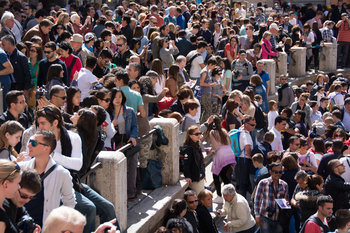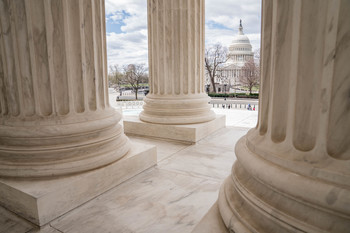|
| |
The role of government is to provide the basic systems of society such as a legal system and to deliver public services such as education. As you might expect, there are different views of this role whereby people may feel that the government should take a smaller role or expanded role in certain areas. For example, many developed nations offer universal healthcare but this is not offered in the United States where this is a political issue1. The following are examples of the role of government.
Agriculture policy | Air and water quality | Birth and death registration | Border control | Budget management | Census administration | Civil rights protection | Commerce regulation | Competition regulation | Consumer protection | Contract enforcement | Criminal justice | Culture promotion | Currency management | Diplomacy | Disaster relief | Election administration | Emergency management | Emergency services | Energy policy | Environmental protection | Financial regulations | Fiscal policy | Fishing regulation | Food and drug regulation | Forest management | Hazardous materials regulation | Health and safety standards | Historical preservation | Humanitarian aid | Immigration control | Intellectual property protection | International relations | Investor protection | Labor market regulations | Land use management | Law and order | Law enforcement | Legal system | Monetary policy | National defense | National parks | National security | Occupational health and safety | Postal services | Product and service standards | Protection of rights and freedoms | Providing and protecting public goods such as national parks | Public broadcasting | Public debt management | Public education | Public health | Public healthcare services | Public housing | Public infrastructure | Public research funding | Public safety and security | Public space | Public utility regulation | Regulation of anti-competitive practices | Small business support | Social welfare | Trade promotion | Transportation safety | Transportation systems | Treaty negotiation | Urban planning | Voting rights protection | Waste management | Wildlife conservation |
NotesThe following countries offer universal healthcare: Australia, Austria, Bahrain, Belgium, Brunei, Canada, Cyprus, Denmark, Finland, France, Germany, Greece, Hong Kong, Iceland, Ireland, Israel, Italy, Japan, Kuwait, Luxembourg, Netherlands, New Zealand, Norway, Portugal, Singapore, Slovenia, South Korea, Spain, Sweden, Switzerland, United Arab Emirates and United Kingdom2.There is a tradeoff between government services and taxation levels. In a state with generous public services, taxation may be more burdensome.There can be a tradeoff between government regulations and freedom. However, regulations are also required to preserve freedom. For example, regulation of anti-competitive practices is required to preserve open competitive markets.A government may regulate many aspects of life whereby some reduction in risk is given as a reason to curtail freedoms. This can be quite contentious.The role of government is greatly expanded in a communist state whereby the government runs the entire economy.
Role Of Government
This is the complete list of articles we have written about role of government.
If you enjoyed this page, please consider bookmarking Simplicable.
References1, 2. "Foreign Countries with Universal Health Care", New York State Department of Health, June 2022.
© 2010-2023 Simplicable. All Rights Reserved. Reproduction of materials found on this site, in any form, without explicit permission is prohibited.
View credits & copyrights or citation information for this page.
|

























